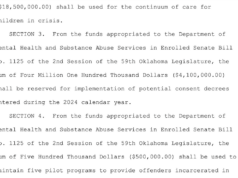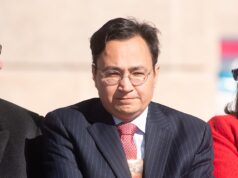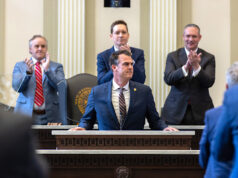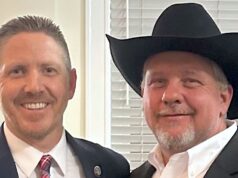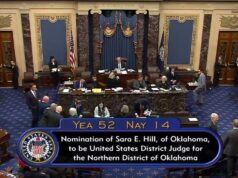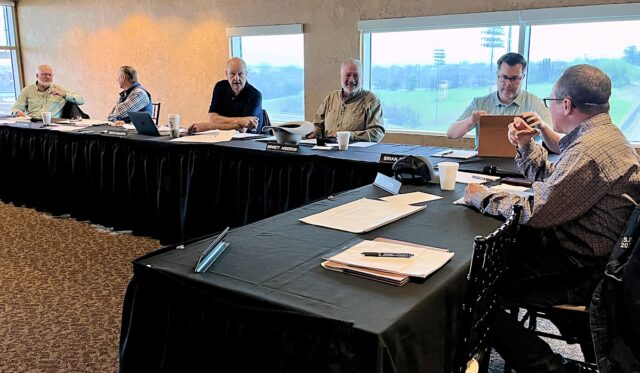
Frustrated by how 2019 licensure actions unfolded and were ruled to have automatically renewed the state’s Model Tribal Gaming Compact, Oklahoma Gov. Kevin Stitt has asked the Horse Racing Commission to pass a resolution heading off similar action a decade down the road.
“Be it resolved that the commission does hereby express its intent to take all steps necessary to ensure compacts entered pursuant to the Model Gaming Compact, which are set to expire Dec. 31, 2034, not be automatically renewed,” the draft resolution states.
This morning, members of the Horse Racing Commission — which governs racing and casino contracts at the state’s three horse tracks — took no action on the proposed resolution, which appeared atop the day’s meeting agenda and raised eyebrows among industry observers.
“In 2019, the commission followed the law exactly as it was written to the letter,” commission Chairman Keith Sanders said during the meeting. “We issued licenses to the three tracks (…) — gaming licenses. In doing so, the compacts were renewed. We knew exactly what we were doing, and did the right thing. The governor wants to change that.”
Sanders said he and Commissioners Bennett Anderson and Kurt Murray received calls from Stitt’s office requesting consideration and approval of his proposed resolution. At a meeting Feb. 20 with a pair of Stitt’s attorneys, the three men were provided draft proposals of the three-page resolution (embedded below).
“If passed, it would express the intent that the organization will license [gaming at race tracks] for the calendar year 2034 would not be issued by the commission without the governor’s approval,” Sanders said during Thursday’s meeting at Remington Park. “This would prevent the automatic renewal of the Model Tribal Gaming Compact. That is not part of the law now, and having questions about what we should do with this request, we referred this to the Oklahoma Attorney General’s Office for advice and counsel, and there will be no more action on that (…) until we get a response from them.”
Post-it notes, state statutes and a decade for drama
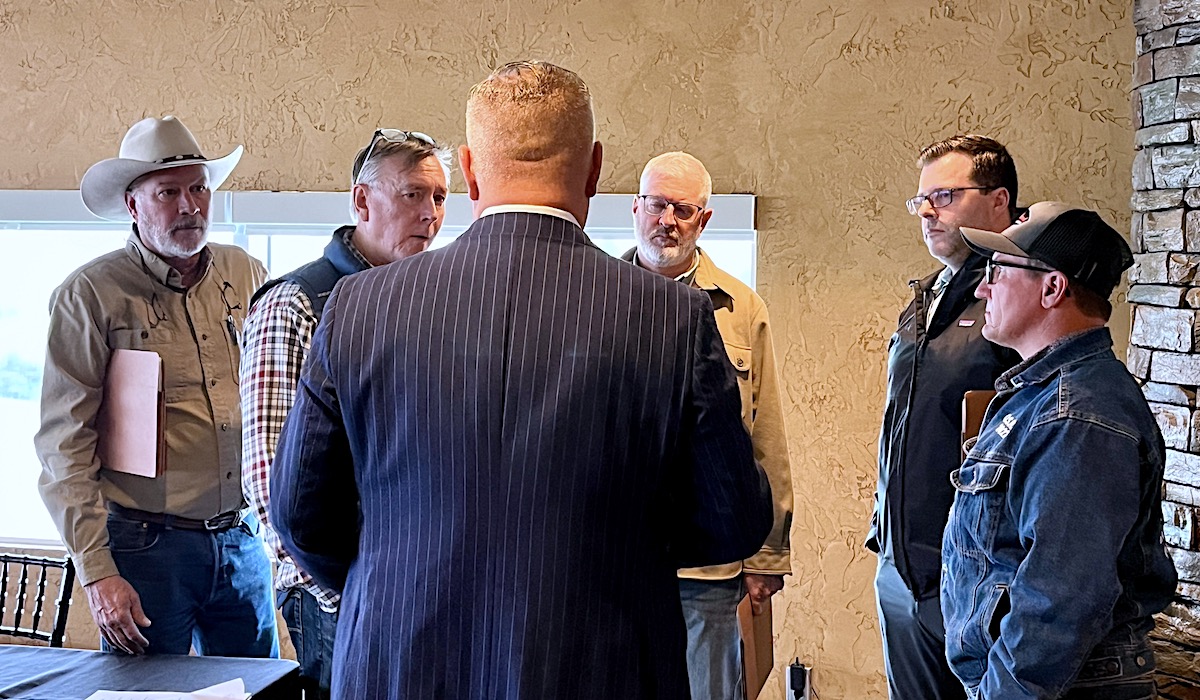
While Attorney General Gentner Drummond’s office did not respond to a call seeking comment on the topic prior to the publication of this article, Stitt’s communications director did offer a brief statement.
“From what I understand, this is a non-binding resolution that would not have any impacts until 2034,” said Abegail Cave. “This is not an attempt to disrupt gaming or the gaming compact — just an effort to ensure the future governor has an opportunity to negotiate percentages, should they need that flexibility in the future.”
After the meeting, current members of the commission also discussed the proposed resolution, which states “the commission desires the state to be in the best position to negotiate terms of compacts entered under the Model Gaming Compact.”
Bennett Anderson, an Oklahoma City resident whom Stitt appointed to the commission in 2019, recalled the Feb. 20 meeting with Stitt’s counsel.
“What I said to the two attorneys we met with at the end is I said, ‘So what you’re really doing is in the 2034 [license discussion] when it comes up for renewal, you’re wanting the commission to put a Post-it note inside it that says, ‘Oh by the way, we need to go to the governor for permission.’ They go, ‘Yeah, that’s a good way to put it. It’s a Post-it note.'”
Like other commissioners, Anderson said the request raises legal questions.
“We don’t have that authority, do we?” Anderson said. “I can’t imagine that something like that has been granted to us and we’re not aware of it.”
Brian Burget, an attorney with McAfee-Taft whom Stitt appointed to the commission in 2021, said he was unfamiliar with the governor’s request until he saw Thursday’s meeting agenda.
“I don’t have much of a comment right now,” Burget said. “I read it for the first time a little more than a week ago. I’m not familiar enough at this time with the law and what the commission can or cannot do with respect to the resolution, so it’s something I have to look into a little bit more.”
Burget said he “will consider what the AG says.”
After Thursday’s meeting, Sanders said commissioners had a “good conversation” with Stitt’s attorneys Feb. 20.
“Basically they explained the governor’s position and what he’d like to see happen, and they presented us with a resolution,” said Sanders, who was first appointed to the commission in 2013 by Gov. Mary Fallin and then was reappointed in two months into Stitt’s first term in 2019.
Sanders recalled the 2019 commission action that a federal judge ultimately ruled had renewed the state’s Model Tribal Gaming Compact, versions of which have been signed by dozens of tribes to conduct Class III casino gaming under state rules that fall within the bounds of the federal Indian Gaming Regulatory Act.
Sanders said Stitt asked commissioners not to approve the “occupation gaming license” renewal applications for the Chickasaw Nation’s casino operations at Remington Park in Oklahoma City and the Cherokee Nation’s casino operations at Will Rogers Downs in Claremore. (Fair Meadows Race Track in Tulsa does not offer casino gaming, but it does have provisions under which tribal casinos within a certain radius share gaming revenue to support horse racing purses statewide.)
“We knew it was coming up,” Sanders said of the 2019 commission action involving gaming licenses for race tracks. “We knew the rules. We knew the consequences. The governor did have a meeting with several of our members, and he basically let them know that he wanted it to get delayed.”
Instead, commissioners said they followed state statute that required them to renew the applications for the gaming agreements at the race tracks.
“If you read the rules about how the application process goes, those three organizations presented application, and unless the application is rejected, we had no choice except to issue a license,” Sanders said. “And we issued the license in terms of the compact renewals. You’ll find all that in the statute.”
Sanders said attorneys advised commissioners to submit Stitt’s requested resolution to Drummond’s office for advice.
“There’s some things in there that we don’t have control over,” Sanders said. “I can’t tell you what you’re going to do in 10 years, and even if I could, is that legally binding? Things like that. Legal stuff. So we expect to get something in response from the attorney general, and we’ll take action appropriately.”
Sanders said an appointed commission does not “make laws.”
“We’ll have a new governor — at least one — in the next 10 years. We’ll have numerous sessions of the Legislature in that period of time,” he said. “It would appear to me that it’s up to the legislative branch and the executive branch to make laws and for them to negotiate in good faith with the tribes about the compacts. It’s not our business. Our business is to follow the law.”
If Stitt wants the law to prescribe a different process for handling gaming licenses at race tracks, he could ask the Legislature to change the complicated and intertwined sections of the Horse Racing Act and State-Tribal Gaming Act in Title 3A of state statute. However, influential tribal nations that operate casinos have prevailed over Stitt’s wishes at the Legislature multiple times in recent years.
“I’m not against what he’s saying at all, but there just has to be a way to do it,” Sanders said of Stitt’s requested resolution. “If you go back and read, there’s no way we could not do what we did in 2019, and theoretically no way in 2034 — unless something changes — that they could do something different, unless the attorney general tells us that resolution has the power of law and is binding on them. I don’t know.”
Former commissioner worries about losing shared revenue
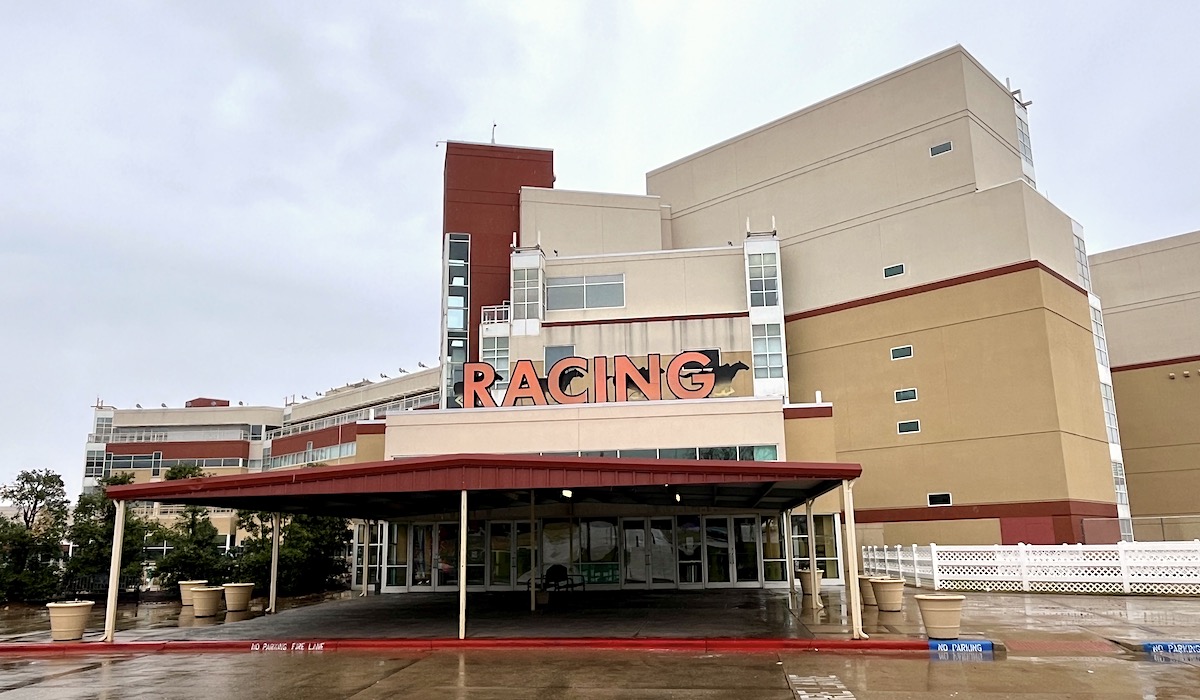
Joe Lucas, a former vice president of the Thoroughbred Racing Association who now consults within the industry, served on the Horse Racing Commission from 2017 to 2023. He was not reappointed by Stitt last year, but he attended Thursday’s meeting.
“This resolution would offer a similar result of the what the governor was asking of the commission in 2019, and basically that is to delay the implementation of the gaming license for the two race tracks and the gaming-recipient license for Fair Meadows,” Lucas said. “And if they’re not in place on Jan. 1 of that year, then the compacts do not automatically renew. That’s the argument.”
However, Lucas said the particulars of state law governing the Horse Racing Commission and state-tribal gaming compacts — which offer Class III electronic gaming exclusivity to tribal governments in exchange for fees paid to the state — are quite complicated and have a variety of requirements and impacts.
He said that although Fair Meadows Race Track in Tulsa is a smaller track with fewer racing days, its impact on the horse racing industry is important. Lucas said the track’s livelihood is tied to shared revenues from a “participating tribe” statutory component in the State-Tribal Gaming Act that provides revenue from neighboring establishments: one Cherokee Nation casino, one Muscogee Nation casino and two Osage Nation casinos.
In exchange for the track not establishing Class III gaming machines, that fund guarantees at least $2 million each year for Fair Meadows race purses, with millions of other dollars divided between thoroughbred and quarter-horse racing at Will Rogers Downs and Remington Park.
“There’s no machines at the track, but we do get a percentage of X-number of machines’ revenue in the Tulsa area in lieu of that, and that’s how that money is derived there,” Lucas said. “If those compacts do not renew on that date, then there is no such thing as a ‘Participating Tribal Fund.’ That money, if it’s not available, will close Will Rogers Downs and Fair Meadows.”
Lucas said he worries the impact on the horse racing industry may not be apparent to everyone, even though sustaining the race tracks was a key component of authorizing Class III tribal gaming in Oklahoma two decades ago.
“People that are not involved in this business don’t understand that, ‘Hey, if we lose that those two race tracks go away.’ OK, they’re little tracks, they’re not as good, so what? Well, the ‘So what?’ is the breeding industry in this state, which is a significant economic engine for Oklahoma,” Lucas said. “If there’s only Remington Park to be raced at, that’s not enough races to sustain that breeding industry in Oklahoma. There’s has to be more races or people ain’t going to be breeding here. But that’s a big component of this thing.”
Lucas agreed with Sanders that the Horse Racing Commission made the proper decision in 2019 when faced with renewal applications that met the three statutory requirements for approval.
“We did it just like the statute says,” he said. “I personally don’t think that this resolution is even — I don’t want to call it legal or illegal — but I don’t think this commission has the authority to make that determination and that it would be able to hold up if contested, and I’m guessing that someone would file an injunction that night.”
In a statement released following the publication of this article, Cherokee Nation Principal Chief Chuck Hoskin Jr. said he supports the Horse Racing Commission’s commitment to “uphold the law.”
“The Oklahoma Horse Racing Commission remains a strong ally for the citizens of Oklahoma as well as good faith partners for tribal governments, including the Cherokee Nation,” Hoskin said. “We support the OHRC’s commitment to uphold the law, and our long-term compact with the state of Oklahoma. We remain confident in the OHRC and its leadership. Together, we will continue to build an industry that helps build Oklahoma’s economy and strengthens tribal-state relations and benefits all 4 million Oklahomans.”
Matthew Morgan, chairman of the Oklahoma Indian Gaming Association, also released a statement Thursday evening.
“This November will mark the 20th anniversary of the state offering through the vote of the people the Class III gaming compacts to tribal governments, which have been an overwhelming success for all parties — the tribes, the state, higher eduction and the horse racing industry,” Morgan said. “We appreciate the work of the Oklahoma Horse Racing Commission and its staff. Furthermore, we applaud Chairman Sanders’ leadership and candid remarks on the matter. Frankly, the actions of the governor’s office on gaming matters continue to be troubling and not in line with letter or spirit of the State-Tribal Gaming Act and our compacts. As we continue to monitor the situation, our OIGA members remain committed to meet their legal obligations under the law, work in good faith with our partners, and work to make our state a successful place to live, work and visit.”
(Update: This article was updated at 3:35 p.m. Thursday, March 21, to include comment from Hoskin. It was updated again at 6:05 p.m. to include comment from Morgan.)
Read Stitt’s proposed Horse Racing Commission resolution
